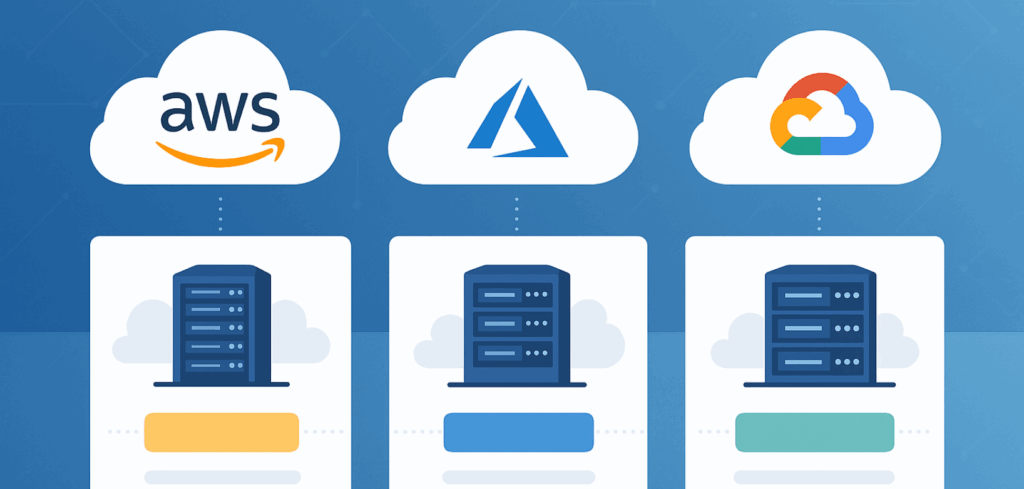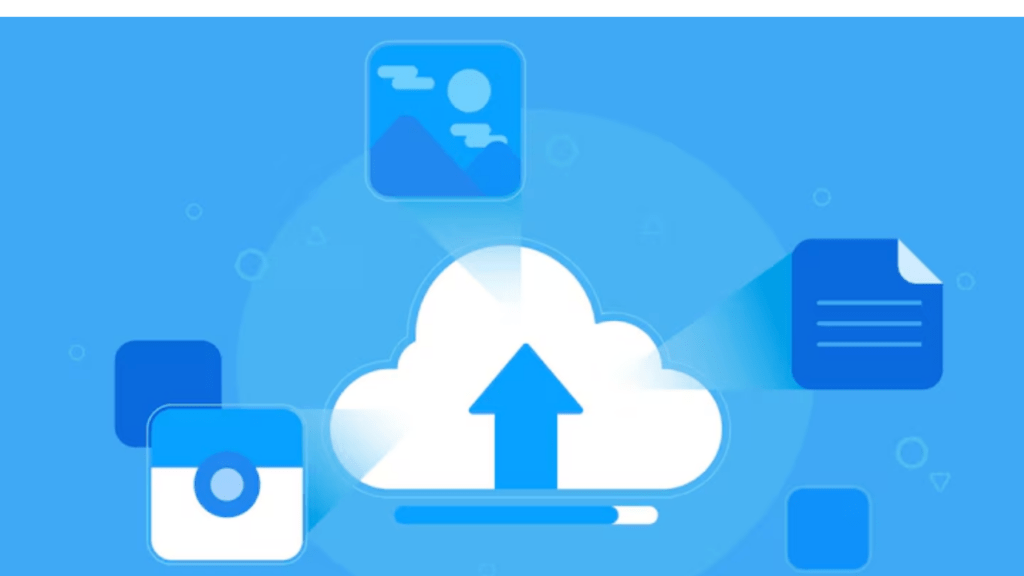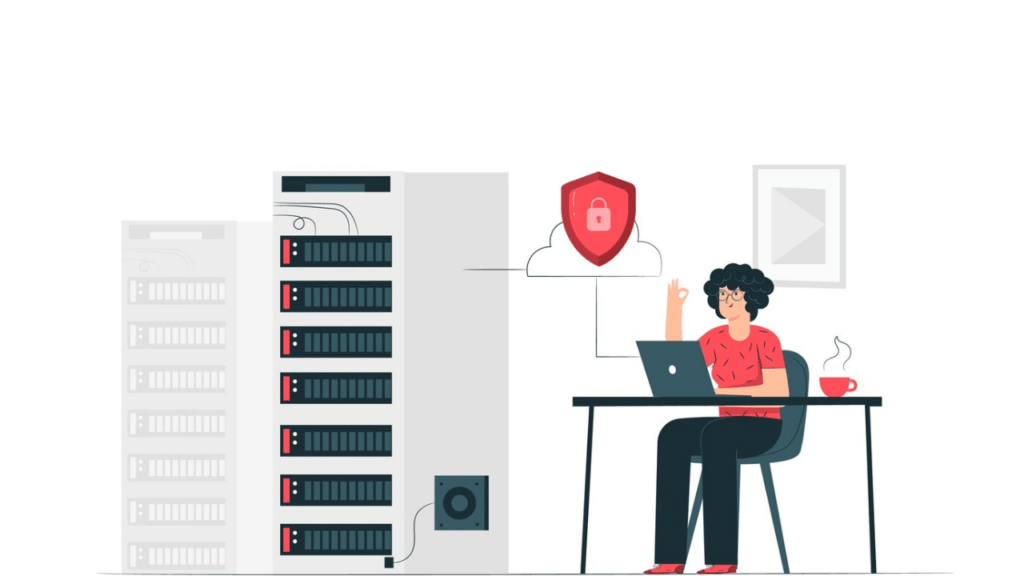
Cloud computing is now a key driver of innovation in healthcare, IT, and skilled trades across the USA. But with AWS, Azure, and Google Cloud leading the market, how do you pick the right platform to future-proof your career?
By 2025, the global public cloud market is projected to reach $723.42 billion, with the U.S. leading the charge. AWS offers unmatched versatility, Azure excels in hybrid solutions, and Google Cloud dominates AI innovation. But what does this mean for your career?
Understanding these platforms is essential whether you’re pursuing certifications or a high-demand role.
Ready to uncover which cloud giant aligns with your goals? Let’s dive into AWS vs Azure vs Google Cloud and find out.
What Is Cloud Computing?
Cloud computing delivers computing services—such as storage, processing power, and software—over the internet, eliminating the need for on-premise infrastructure. It’s categorized into three core components:
- IaaS (Infrastructure as a Service): Provides virtualized computing resources like servers and storage (e.g., AWS EC2).
- PaaS (Platform as a Service): Offers tools and platforms for developers to build and deploy applications (e.g., Google App Engine).
- SaaS (Software as a Service): Delivers ready-to-use software applications over the internet (e.g., Microsoft 365).
The benefits of cloud computing are undeniable: scalability, cost-efficiency, global accessibility, and faster innovation. Industries like healthcare, IT, and skilled trades are using AWS, Azure, and Google Cloud to transform operations, enabling secure data management, streamlined workflows, and AI-driven solutions. But how can professionals in these fields fully leverage these tools to stay competitive?
Mastering cloud computing isn’t optional for those looking to future-proof their careers—it’s essential.
What Is AWS?
Amazon Web Services (AWS) isn’t just a cloud platform—it’s the backbone of innovation for businesses worldwide. As of 2023, AWS had a staggering 33% of the global cloud market share, powering everything from small startups to tech giants like Netflix and Airbnb.
So, what makes AWS the top dog? Imagine a toolbox so versatile it can handle anything—scaling apps, storing massive datasets, or even building AI-powered solutions. AWS delivers:
- Compute Power: EC2 instances that grow with your needs.
- Storage: S3 buckets for secure, scalable data storage.
- Databases: Fully managed services like RDS and DynamoDB.
- AI/ML Magic: Tools like SageMaker to turn data into actionable insights.
But here’s the real kicker: AWS offers over 200 services, more than any other provider, across a network of 36 global regions. Need to deploy an app in Tokyo while managing data in Texas? AWS has you covered.
For professionals eyeing high-demand roles, mastering AWS isn’t just smart—it’s a career game-changer.
What Is Microsoft Azure?
Microsoft Azure isn’t just another cloud platform—it’s the go-to choice for businesses deeply embedded in the Microsoft ecosystem. With 22% of the global cloud market share as of 2023, Azure has firmly established itself as a top contender, especially among enterprises seeking seamless integration and hybrid flexibility.
What sets Azure apart is its ability to bridge the gap between on-premise infrastructure and the cloud. Key features include:
- Hybrid Cloud Solutions: Effortlessly connect on-premise data centers with cloud resources.
- Enterprise-Grade Security: Advanced tools to safeguard sensitive data and meet compliance standards.
- AI and Analytics: Pre-built AI models and powerful analytics to drive smarter decision-making.
Azure’s secret weapon? Unmatched compatibility with Microsoft tools like Office 365, Active Directory, and Windows Server, making it a natural fit for organizations already in the Microsoft ecosystem. Plus, its robust hybrid cloud support allows businesses to seamlessly transition to the cloud while retaining legacy systems.
If AWS is the jack-of-all-trades, Azure is the enterprise specialist—making it a favorite for industries like finance, healthcare, and government.
Azure vs AWS Key Features
| Feature | Microsoft Azure | AWS |
| Market Share (2023) | 22% | 33% |
| Hybrid Cloud Support | Native hybrid capabilities | Requires third-party tools |
| Integration | Seamless with Microsoft products | Broad but less native to Microsoft users |
| Security | Enterprise-grade, compliance-focused | Highly secure, industry-standard |
| AI/ML Tools | Pre-built AI models, Azure ML | SageMaker, an extensive AI/ML services |
| Global Reach | 60+ regions | 31 regions, 99 availability zones |
For professionals aiming to align with enterprise needs or leverage Microsoft’s ecosystem, Azure offers unmatched advantages.
What Is Google Cloud Platform (GCP)?
Google Cloud Platform (GCP) may account for roughly 11% of the global cloud market as of 2023, but its influence far outweighs its market share. Built on Google’s cutting-edge technology, GCP is a leader in data analytics, machine learning, and Kubernetes-native services, making it a top choice for startups and data-driven industries.
Here’s why GCP stands out:
- Data Analytics: Tools like BigQuery enable businesses to process massive datasets in seconds.
- AI and Machine Learning: Vertex AI and AutoML make advanced AI accessible even to non-experts.
- Kubernetes Leadership: As the creators of Kubernetes, GCP offers unparalleled container orchestration capabilities.
What makes GCP unique? Its focus on speed, scalability, and innovation —perfect for organizations looking to push boundaries. Startups love GCP for its competitive pricing and credits, while enterprises rely on its AI-driven tools to uncover insights and drive smarter decisions.
For professionals aiming to master next-gen technologies, GCP offers a gateway to the future of cloud computing.
AWS vs Azure vs Google Cloud: A Detailed Comparison
Choosing the right cloud provider isn’t just about picking a name—it’s about aligning with the platform that best fits your goals. Let’s break it down and see how AWS, Azure, and Google Cloud stack up across key categories like market share, pricing, strengths, and service offerings. Spoiler alert: Each has its secret sauce.
Comparison Table
| Feature | AWS | Azure | Google Cloud (GCP) |
| Market Share (2023) | ~33% | ~22% | ~11% |
| Pricing Model | Pay-as-you-go | Flexible pricing | Competitive discounts |
| Core Strengths | Versatility & scale | Hybrid cloud expertise | AI/ML innovation powerhouse |
| Global Infrastructure | Largest network (31 regions) | Enterprise-grade reliability | High-performance tools for speed |
Service Offerings
- AWS:
- Compute: EC2 (virtual servers on steroids).
- Storage: S3 (your data’s safe haven).
- Serverless: Lambda (run code without the headache).
- AI/ML: SageMaker (turn data into gold).
- Azure:
- Compute: Virtual Machines (Windows-friendly flexibility).
- Databases: Azure SQL (enterprise-ready databases).
- AI/ML: Cognitive Services (AI that works for you).
- GCP:
- Data Analytics: BigQuery (process petabytes in seconds).
- Serverless: Cloud Functions (code without constraints).
- AI/ML: Vertex AI (AI magic made simple).
Why Choose One Over the Other?
- AWS: If you want the Swiss Army knife of cloud platforms—versatile, reliable, and packed with features—AWS is your go-to. It’s the undisputed leader for a good reason.
- Azure: Need to integrate with Microsoft tools or build hybrid solutions? Azure’s seamless compatibility with Office 365, Active Directory, and Windows Server makes it a no-brainer for enterprises.
- GCP: For startups and innovators, GCP is the playground of choice. Its AI/ML tools are unmatched, and its pricing model is kinder on the wallet.
Whether you’re chasing scalability, hybrid flexibility, or AI-driven insights, there’s a cloud provider tailored to your needs. The real question is, Which one matches your vision?
Azure Advantages Over AWS
While AWS leads in market share, Microsoft Azure has distinct advantages that make it a top contender—especially for enterprises. Let’s dive into the areas where Azure outperforms AWS, complete with a comparison table to make things crystal clear.
Key Areas Where Azure Outshines AWS
- Hybrid Cloud Mastery:
- Azure offers tools like Azure Arc and Azure Stack, enabling seamless integration of on-premise and cloud environments.
- Perfect for businesses transitioning to the cloud without abandoning legacy systems.
- Microsoft Ecosystem Integration:
- Native compatibility with Office 365, Active Directory, and Windows Server makes Azure a natural fit for organizations already using Microsoft products.
- Simplifies workflows and reduces operational complexity.
- Enterprise-Friendly Pricing:
- Flexible pricing models like pay-as-you-go, reserved instances, and Azure Hybrid Benefit (savings through existing Microsoft licenses).
- Often more cost-effective than AWS for large-scale enterprise deployments.
- Industry-Leading Compliance:
- Azure boasts over 90 compliance certifications, including GDPR, HIPAA, and FedRAMP, making it ideal for regulated industries like healthcare and finance.
- AI and Analytics Tools Tailored for Enterprises:
- Services like Azure Cognitive Services and Power BI provide enterprise-grade AI and data visualization capabilities.
- Strong Support for Windows Workloads:
- Azure is optimized for running Windows-based applications, offering better performance and licensing options than AWS.
Why Azure Could Be Your Best Choice
Azure isn’t just a cloud provider—it’s a strategic partner for enterprises navigating complex digital transformations. Its hybrid expertise, deep Microsoft integration, and compliance-heavy approach make it a standout choice for businesses prioritizing security, flexibility, and scalability.
The decision ultimately hinges on your specific needs when comparing Azure vs AWS. Azure takes the crown if hybrid flexibility, enterprise-grade tools, and seamless Microsoft integration are priorities.
AWS vs Google Cloud vs Microsoft Azure: Which One Should You Choose?
Choosing the right cloud provider depends on your business needs, budget, and goals. Let’s break it down by user profiles to help you decide—and remember, securing your chosen platform is just as crucial as selecting it.
Factors to Consider When Choosing a Cloud Provider
- Business Size and Industry:
- Startups may prioritize cost-effectiveness and innovation.
- Enterprises often need hybrid solutions and compliance-heavy tools.
- Budget and Scalability Needs:
- AWS offers flexible pricing but can get expensive at scale.
- Azure provides enterprise-friendly discounts and licensing benefits.
- GCP is known for competitive pricing and generous free tiers, which are ideal for smaller budgets.
- Specific Use Cases:
- AI/ML Innovation: GCP leads with tools like Vertex AI.
- Hybrid Cloud Deployments: Azure excels with Azure Arc and Stack.
- Versatility and Scale: AWS is unmatched for its diverse service offerings.
Recommendations for Different User Profiles
Here’s a quick breakdown of which platform suits different user types best:
| User Profile | Best Cloud Provider | Why It’s a Fit |
| Startups | Google Cloud (GCP) | Cutting-edge AI/ML tools, Kubernetes-native services, and competitive pricing. |
| Enterprises | Microsoft Azure | Seamless hybrid cloud integration, Microsoft ecosystem compatibility, and security. |
| General-Purpose Users | AWS | Versatile service catalog, global infrastructure, and scalability for any use case. |
The Verdict: Which One Fits Your Goals?
Your choice ultimately boils down to your priorities:
- Innovation-driven startups? Go with GCP.
- Enterprise-grade reliability? Choose Azure.
- All-in-one versatility? Stick with AWS.
By aligning your needs with the strengths of each provider, you’ll set yourself up for success in the cloud.
Cloud Security: Why It Matters
Securing your cloud environment is critical, no matter which platform you choose. Explore our Cyber Security Program to learn how to protect AWS, Azure, and GCP environments from cyber threats. For more insights, visit our blog on Understanding Cyber Security to discover strategies for safeguarding data and ensuring compliance across cloud platforms.
Conclusion
Still unsure which cloud provider is right for you? Let’s recap: AWS offers unmatched versatility, Azure excels in hybrid solutions and enterprise integration, and Google Cloud leads with AI-driven innovation. Each platform caters to different needs, whether you’re a startup, an enterprise, or a general-purpose user. And don’t forget—securing your cloud environment is just as critical as choosing the right platform.
Ready to level up? Explore cloud training programs at CCI Training Center and stay ahead in the IT industry. Enroll in our short-term certification programs to gain hands-on cloud expertise and secure your future today!
Program Offered
- Pharmacy Technician Training
- Online Medical Assistant
- Medical Billing and Coding Specialist Program
- Cloud Computing Technician Training
- Computer Network Technician
- Business and Accounting
- Radiology Technician Training
- Medical Assistant Program
- Computer Support Technician
- Cybersecurity Program
- Virtual Assistant Training

This article is written by
Share this article
Program Offered
- Pharmacy Technician Training
- Online Medical Assistant
- Medical Billing and Coding Specialist Program
- Cloud Computing Technician Training
- Computer Network Technician
- Business and Accounting
- Radiology Technician Training
- Medical Assistant Program
- Computer Support Technician
- Cybersecurity Program
- Virtual Assistant Training

This article is written by
Share this article
Frequently Asked Questions FAQ's
What sets AWS, Azure, and Google Cloud apart?
AWS is the Swiss Army knife of cloud platforms, offering unmatched versatility. Azure shines with its seamless integration into the Microsoft ecosystem, while GCP steals the show with cutting-edge AI and machine learning tools.
Which cloud platform should beginners start with?
AWS is your best bet! With its beginner-friendly free tier and a treasure trove of documentation, it’s like training wheels for cloud computing.
Is Azure the ultimate choice for enterprises?
Absolutely! If your business runs on Microsoft products like Office 365 or Active Directory, Azure feels like home—offering hybrid solutions and enterprise-grade reliability.
Who wins the pricing game among cloud providers?
GCP takes the crown here, especially for startups and small businesses, thanks to its competitive pricing and generous discounts.
Can I mix and match cloud providers?
You bet! Many organizations use a multi-cloud strategy to combine the strengths of AWS, Azure, and GCP. Why settle for one when you can have the best of all worlds?
Related Articles


















